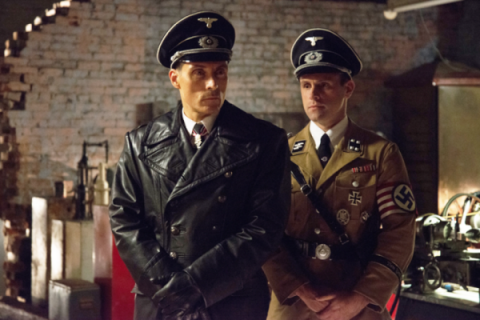Having watched both seasons of Man in High Castle within the last month, I have to say: I don’t get it. I like the premise, and the dramatic promise inherent in a series about what an America might look like if Japan and Germany had won World War II, but somewhere along the way, that promise was lost. As some have already pointed out, Man in High Castle has the look and feel of a prestige sci-fi show, but it’s all smoke and mirrors. Its dramatically inert, poorly written, often badly acted, boring, and weirdly confused about what it’s trying to do. I didn’t much like the first season once it settled into its premise, but having seen the second season now, there’s no mistaking it: Man in High Castle is a bad show.
Stephen Root is in the second season of Man in High Castle, which might have been a big selling point for those on the fence about continuing with the series. It shouldn’t be. Root is only in a handful of scenes in the entire season, and while he is good, his character isn’t. The show’s title character is a bit like Oz’s Wizard: The man behind the curtain whose motives are uncertain. He’s seen the film reels from the various alternate histories, and while he can’t really use that knowledge to affect the events of High Castle’s reality, he does have knowledge of the future, and he knows that the events in each of the alternate realities all revolve around Juliana Crain (Alexa Davalos). That’s too bad, really, because Man in High Castle suffers from a bad case of Weak Lead Syndrome — the character is not only poorly written, but while some actors are capable of transcending bad writing, Davalos does whatever the opposite of that is. It’s an acting face plant.
The only time that Man in High Castle really shines is when Rufus Sewell is onscreen, which makes the series even more troubling. Rufus Sewell plays Obergruppenführer John Smith. He’s a Nazi leader, and a really bad one. He’s all about the Master Race, and he wouldn’t blink twice before killing a Jew or even someone born with a birth defect in order to maintain the purity of the race. However, when Smith’s son is discovered to have a genetic defect — one which Smith passed on to his son — he’s all too willing to sacrifice the cause for the good of his kid, which makes Sewell’s character sympathetic, which IS NOT OKAY. We should never want to sympathize with anyone with Obergruppenführer in their title, and we should never feel sorry for a kid willing to sacrifice himself for the good of the Master Race.
Likewise, we find ourselves sympathizing with Inspector Kido (Joel de la Fuente), a Japanese leader who is trying to prevent a war between the Nazis and Japan. He knows that it’s a war Japan cannot win because Germany has a nuke. He’s even willing to sacrifice his own life to save the Japanese Empire. Great, right? Here’s a guy we can get behind! Oh, except for the fact that he had an entire innocent Jewish family exterminated. Oh, just that.
Elsewhere, Joe Blake (Luke Kleintank) is sidelined in Germany for most of the season, getting to know his estranged father, who is another Nazi leader. Joe is also a morally ambiguous character, sort of. He hates his father, and then he finds out something about his Dad that makes him hate him a little less, and then he’s on his father’s side until his father decides to start a nuclear war and then Joe is conflicted enough to pit Nazi against Nazi, which leaves the viewer in the unenviable position of rooting for the lesser of two evils, which is really not saying much since both evils want to wipe out Jews.
There’s also the Resistance, which represents the interests of America, I guess? But they’re depicted almost like a terrorist organization, committing random acts of violence to … prevent a nuclear war? Or to collect film reels of alternate realities for the Man in High Castle so that he can prevent a nuclear war? Honestly, the goals of the organization aren’t clearly stated, and most of the Resistance fighters are bad people in their own right.
Meanwhile, the central characters — Joe, Julianne, Frank — are mostly pawns for the causes of other organizations, and their own allegiances seem to shift with the wind. Everyone they end up aligning with has an evil ulterior motive.
Indeed, the only character besides Robert Childan and Ed McCarthy (who strangely act almost as comic relief at this point) that anyone can really get behind is Japan’s Trade Minister, Nobusuke Tagomi (Cary-Hiroyuki Tagawa), who is great, only he spends much of the season living in our reality. He’s the best part of the show, and he’s critical to the season’s end goal, but he also spends most of the season twiddling his thumbs.
To be honest, most of the characters do. In fact, viewers could get away with watching the first episode of the season and skipping to the last two episodes, and not much will have been missed. There are roughly seven interminable episodes of filler material, before — like season one — the final two episodes create just enough intrigue to keep us interested in coming back for a third season. Next year, however, they’re going to have to promise a lot more than a handful of Stephen Root scenes to get me back. A good starting point would be to stop making the Nazis and Japanese imperialists the most compelling characters in the series.


Spread the word